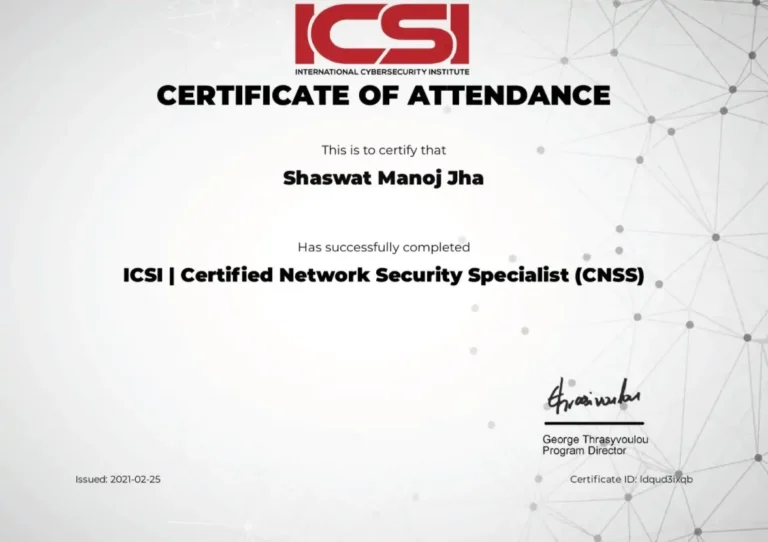ICSI CNSS: Certified Network Security Specialist
Category
Cybersecurity
Issued By
ICSI Cybersec Institute
Issue Date
July 25th, 2021
Certification ID
ldqud3ixqb

Certification Details
The ICSI CNSS (Certified Network Security Specialist) is a certification offered by the International CyberSecurity Institute (ICSI) in the UK. This certification is designed to validate an individual’s expertise in network security. The CNSS certification covers a wide range of topics, including network security principles, protocols, threats, and countermeasures, helping professionals demonstrate their ability to secure and protect networks.Course Structure and Duration
I recently finished the course, which I found to be really well-structured, especially for those starting from the basics or with some intermediate knowledge. The content was solid, and there were quizzes we had to pass to get the certificate.
One thing that bothered me, though, was that the certificate is labeled as a “Certificate of Attendance.” Since I had to pass an exam after each module, I feel it should have been called a “Certificate of Completion,” but it’s not a big deal.
After a lot of time and effort, I finally wrapped up all 13 modules. It took me longer than expected because of my busy schedule, but honestly, the course could easily be completed in about two months.
What topics were covered ?
There were 13 modules from different areas of security, and overall it was a comprehensive curriculum to be followed.
Below are the modules.
- Module 1 : Introduction to Network Security
- Module 2 : Types of Attacks
- Module 3 : Fundamentals of Firewalls
- Module 4 : Intrusion Detection System
- Module 5 : Fundamentals of Encryption
- Module 6 : Virtual Private Networks (VPN)
- Module 7 : Operation System Hardening
- Module 8 : Virus Attacks and How To Defend
- Module 9 : Security Policies
- Module 10 : Assessing System Security
- Module 11 : Security Standards
- Module 12 : Physical Security and Recovery
- Module 13 : Attackers Techniques
